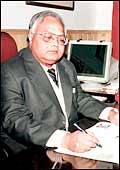 |
 |
SAYS HE IS CLEAR
ABOUT ADDRESSING A DIFFERENT IDIOM AT THE SCHOOL
Kanti Bajpai
The Doon School |
SAYS HE IS STILL RATHER BUSY
PUTTING OUT ONE FIRE AFTER ANOTHER
Gautam Chatterjee
The Lawrence School |
So,
when are they going to list on the stockmarket?" asked the
old boy, in response to the 'corporatisation' of the hallowed school
portals through which he had long passed, having successfully ensured
that his education did not interfere much with his growing up. "...if
that's what it has come to."
Grant him his pique. Old boys of boarding schools
are zealously possessive about the places of their zaniest memories,
zippiest experiences and zygotic adolescences. They've 'passed out'
years ago, but never really left. In truth, though, there's nothing
to be alarmed about. The 'corporatisation' refers to nothing more
drastic than the use of headhunters to nab headmasters.
Busting Bounds
Still, accusatory fingers tend to turn towards
The Doon School, Dehradun, which kickstarted it all-busting the
bounds of convention by opting for a headhunter instead of the usual
network of old hands, "the bizarre merry-go-round" on
which "the same five to seven names keep circulating",
in the words of Derek Mountford, Headmaster, Assam Valley School.
After the 2003 departure of Doon's former headmaster John Mason,
the board of governors took the liberty of getting a Delhi-based
headhunter to find a replacement. How come? "There is a scarcity
of talent and poor response to advertisement," explains Ronesh
Puri, Managing Director, Executive Access, the search firm that
took on the task. Indeed, such a school principal is expected to
be something of a boarder himself (culturally speaking), as also
a straightfaced academic: a rare hybrid. Such an individual, once
traced, would also have to be persuaded-and that's how Kanti Bajpai,
ex-Dosco, JNU professor of International Relations and TV soundbite
man, took charge as Doon's headmaster.
With a foot through the headmastership door, so to speak, Executive
Access has since notched up a couple of other high-profile placements
at India's so-called 'public schools': one, Dev Lahiri at the head
of Welham Boys' School, Doon's one-time prep school in Dehradun,
and two, Gautam Chatterjee at The Lawrence School, Sanawar, which
is co-ed. Meanwhile, Ma Foi has placed Derek Mountford, the former
shake-up man of Sanawar where the 33-year-old was acting principal
briefly before Chatterjee took over, at Assam Valley School.
If this is corporatisation, there's no escaping
it. The headhunters are in, and so is the process. "It gives
the board a certain degree of unimpeachibility," reckons Bajpai,
who thinks "modern methods of hiring and firing need to come
into practice".
| A boarding school's principal needs to be
a boarder himself and a straight-faced academic: a rare hybrid |
Toy Time
If executive headhunters
have gained ground, it's also because they have done their professional
homework on who can click and who cannot-in this specialised role.
Bajpai, for example, is clear that after JNU, he's now addressing
a "different idiom", an idiom of 500 Doscos, not just
students. Thankfully, the school's governing board is deeply involved-helping
him toy with new ideas, for instance. And Bajpai is also comfortable
with the corporate way his performance is judged. "There is
an annual referendum in the form of board results," he says,
"the results are equivalent to corporate balance sheets."
Welham Boys' principal Lahiri, who recently
took over from the late 'Charlie' Kandhari, has experimented with
stints at "instant schools" such as SelaQui, Dehradun,
and Heritage, Kolkata. But this, really, is different. There is
no training for the "hot seat of the headmaster", he says.
In an age when students have to be taught to access knowledge rather
than be fed it, a headmaster must play a multitude of roles-"from
chief chowkidar to chief shoulder to cry on". With Welham Girls'
School across 'The Wall', this requires special skills, no doubt.
But on the whole, for Lahiri, the job is "about the imprint
you leave behind".
 |
 |
FEELS A BOARDING
SCHOOL PRINCIPAL MUST ALWAYS PLAY A MULTITUDE OF ROLES
Dev Lahiri
Welham Boy's School |
THINKS ONLY A PUBLIC
SCHOOL
MAN CAN RUN A PUBLIC SCHOOLS
Derek Mountford
Assam Valley School |
"Only a public school man can run a public
school," says Mountford, who feels age went against his being
appointed headmaster of his pined-for Sanawar, and is glad to be
given "a long innings" at Assam Valley-with which he has
synchronised his value system.
Olive Time
The test case of headhunter appointments, however,
is Sanawar-a school witness to much turbulence, punctuated by old
boy interventions, ever since Andrew Gray's headmastership (2000-2003).
The headmaster's appointment here is a tortuous process, as the
board is chaired by the Union HRD Ministry's Secretary of Education,
and must always include a senior Armed Forces officer. So there
was quite a flap when Chatterjee, appointed only in September 2003,
resigned in January 2004. "I love my job, and as long as I
am here, I will take care of the school," says this US-returned
academic, still busy "putting out one fire after another".
Why did he resign? He speaks of an "alternate power centre"
(though without mentioning the old boys' network). "When the
board appointed me," he reflects, "I think they got the
Ivy League and Ivory tower mixed up-much to their chagrin."
So, is this post being hunted for again? Maybe
not. Last heard, the Sanawar board was offering an olive branch.
SPOTLIGHT
Sameer Kulkarni
 |
| Creativity and responsibility: That's
Kulkarni's recipe for success |
If finance is your
dream career, maybe managing a few thousand crores of investor funds
should be your goal. That's what a good fund manager at a mutual
funds does. It takes mathematical acumen, corporate knowledge, and
an analytical mind, not to mention such qualifications as an MBA
and perhaps Certified Financial Analyst (CFA) or Financial Risk
Manager (FRM). Above all, according to Sameer Kulkarni, 35, Head
of Fixed Income, Templeton Mutual Fund, Franklin Templeton India,
it takes responsibility. "One is managing someone else's money,"
he emphasises. But that's not all. Right-brain thinking counts,
too. "Creativity is important for a fund, and I love cooking
and experimenting. Take, for instance, aubergines and roasted capsicum.
It tastes really good," says Kulkarni, with childlike enthusiasm.
-Aditya Wali
COUNSELLING
Help, Tarun!
 I am a 24-year-old electrical engineer working as a technician with
the Indian Railways for the last couple of years. This job is not
offering me any opportunity for growth, and I want to make a switch
to the corporate sector. But I believe I need additional educational
qualifications for that. Should I go in for an MBA through correspondence
from a good B-school? I am not in a position to consider a full-time
one because it is not possible for me to quit my job on account
of financial constraints. Please advice.
I am a 24-year-old electrical engineer working as a technician with
the Indian Railways for the last couple of years. This job is not
offering me any opportunity for growth, and I want to make a switch
to the corporate sector. But I believe I need additional educational
qualifications for that. Should I go in for an MBA through correspondence
from a good B-school? I am not in a position to consider a full-time
one because it is not possible for me to quit my job on account
of financial constraints. Please advice.
An MBA through correspondence will not increase your chances of
getting into the corporate world. Ideally, you should have gone
in for a full-time MBA. However, since that is not possible, you
could apply for a job in the electrical industry. A position in
the electrical maintenance department in a factory, for example,
could be an option. That way, you would enter the corporate sector,
and once there, you could work your way up. Remember, however, that
it would not be easy, and you may be deprived of some of the benefits
you are currently enjoying with the Railways.
I am a 21-year-old commerce graduate, planning
to do an MBA from a reputed B-school. Though I took the CAT last
year and got calls from a couple of leading B-schools, I could not
convert the calls to selection. Now I am confused about what I should
do. Should I work for two years and then give MBA a try again, or
should I go in for a course in investment analysis since I am interested
in finance. If I opt for the latter, what are the job options available
to me after I'm done with the course?
The fact that you got calls from A-grade schools
reflects that you have the aptitude to get through a good B-school.
However, since you couldn't pass the interview stage, you would
do well to brush up your communication skills. If you have friends
at relatively senior levels in the corporate world, ask them to
give you mock interviews. MBA coaching classes could help as well.
Don't contemplate a change of discipline just because you couldn't
make it through the interview. Try again next year. In the meantime,
if you get a job, start working so that you do not waste the year.
I am a 23-year-old B-Tech (Computer Science)
planning to pursue a post-graduate diploma in marketing management
from a reputed management institute. I want to know what kind of
job options would be available to me after I graduate. If, however,
I do not opt for this course, would joining a BPO firm that does
off-campus tests for IT companies be a good option? Or should I
take up teaching in a private engineering college? Would I need
to get additional degrees or diplomas for these?
It seems to me that you have lost focus. Before
you even choose to take up a job, you need to have a good idea of
what it entails. Private engineering colleges may not pay according
to your expectations, but could give you job satisfaction if you
really love teaching. However, BPOs would not provide avenues for
growth, even if the immediate compensation and employment opportunity
is high. You could, however, always go in for additional degrees
or diplomas in it or marketing to enhance your marketability. But
ultimately, you would need to decide where your interest and aptitude
lies, and choose a profession accordingly.
I am a 25-year-old law graduate with a
bachelors degree in economics from a reputed college in Delhi. For
the past one year, I have been working with a high court advocate
as his assistant. However, I want to switch to a job that does justice
to my knowledge of economics and civil law, together. Is there any
such job? What are the prospects available to me in the corporate
world?
Since you want your knowledge of economics
and law to be of simultaneous use, you would do well to apply to
the legal department in a medium-sized or large company, at the
trainee level. Many such companies have legal personnel employed
full time even if they go to established lawyers as and when special
problems arise. Doing a course in company secretariship, though
a long-drawn process, would also be a profitable option for you.
The job of a company secretary, besides paying you well, would address
your desire to dabble in both legal and economic issues at the same
time.
Answers to your career concerns are contributed
by Tarun Sheth (Senior Consultant) and Shilpa Sheth (Managing
Partner, US practice) of HR firm, Shilputsi Consultants. Write to
Help,Tarun! c/o Business Today, Videocon Tower, Fifth Floor, E-1,
Jhandewalan Extn., New Delhi-110055.
The
Secretary Pageant
Recognition for the
unrecognised-it works.
 |
| Gripping the nation's attention:
Jassi, the uncrowned secretary of Indian television |
Being
identified publicly as somebody's appendage all the time is no fun;
ask the legions of secretaries in offices, who rarely have an identity
independent of their boss'. So when they get recognition-that too
from the country's best recognised 'secretary'-it serves as a morale
boost.
Recently, in a scene straight out of Miss Universe,
a Delhi ballroom was treated to the fanfare of Jassi, the bespectacled
lady with the signature metallic smile from Sony's hit TV show Jassi
Jaissi Koi Nahin, crowning Neena Sharma, a GE Cap secretary, the
winner of a 'Secretary of the Year Contest'.
Jassi, who Indian audiences can't get enough
of, plays the TV role of a plain-Jane secretary with star-like ambitions
and a crush on her boss. Here, she played crowd and flashbulb magnet.
Sharma, though, who won the contest by giving an impromptu speech
on whether single women make better bosses (her answer: it makes
no difference), was candid about not watching the TV show. "But
I've heard it portrays secretaries in good light," she said,
approvingly.
-Sushma Subramanian
Renewed
Incursion
Why the sudden jump
in female IIM admissions?
 |
| Rising numbers: More and
more women are getting admission, but how far will they go in
India Inc? |
The
gender ratio at IIMs has always been an embarrassment. Suddenly,
it's less so. But the change doesn't surprise Bakul Dholakia, Director,
IIM-Ahmedabad, which boasts of 16.5 per cent female admissions this
year, up from 12.5 per cent in 2003. "This had to happen,"
he says. Are women suddenly more interested in management, or has
the cat bias in favour of super-numerate engineering studs been
eased? "Neither," replies Dholakia, "it is simply
a question of the ratio of applicants. The number of women applicants
has increased and ceteris paribus, the inevitable consequence-more
women have qualified."
As many as 3,588 girls (about 15 per cent of
all female applicants) got IIM-A interview calls this year, up sharply
from about 2,090 in 2003. Girls are evidently cracking the cat with
greater vigour-though their relative lack of work experience still
holds them back, says Dholakia. Career advisor Usha Albuquerque
also sees the inevitability of progress at work. "Women are
now aspiring to get into courses that were earlier considered male-dominated,"
she says. How long, though, before corporate boardrooms are stormed?
-Ananya Roy
|
